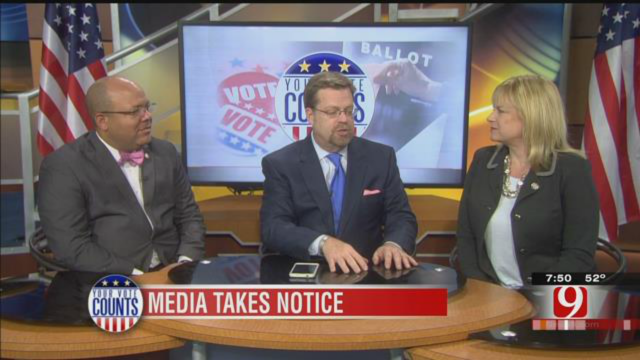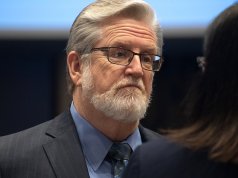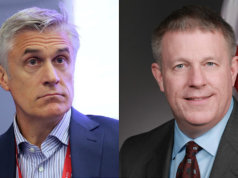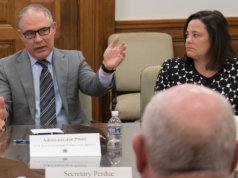

The workers’ compensation story that NPR and ProPublica released last week caught the attention of KOKC 1520’s Scott Mitchell. As host of News 9’s Sunday morning TV show Your Vote Counts, the talk jock opened this week’s episode with some criticism for the Oklahoma press corps, saying it has failed to cover the workers’ compensation story locally.
“The Capitol press corps is missing this story on comp,” Mitchell said in the show’s opening minute. “It’s a big, monster story about what might happen if the law is repealed.”
The host of Mitchell in the Morning (on which NonDoc’s editor in chief has appeared) added later: “It’s no longer a secret — only to the Capitol press corps.”
Context for reporting on the story
While we definitely support the idea of responsibly calling on media to be more constructive, Mitchell’s criticism Sunday warrants some context that is hard to offer in such a short soundbite.
For instance, let’s sum up the “story” being discussed. Workers’ compensation law reforms in Oklahoma and Texas have allowed companies to opt out of state comp plans and develop their own plans to provide benefits to injured workers. While some have rhetorically criticized this new process as companies providing less for those injured on the job, the two national journalism organizations poured through actual comp-plan documents to compare apples to apples. Check out ProPublica’s version for more specifics.
Indeed, a Google News search Tuesday for the term “workers compensation Oklahoma” revealed that no local media — other than NPR affiliates — referenced this major piece of investigative journalism online during the past week. That includes us, though we wrote about it in this week’s Roundup.
BUT, if one extends the Google search to include the past year, the robots can show us a Sept. 10 article from Tulsa World staff writer Randy Krehbiel that features a former workers’ comp administrator saying Oklahoma’s injured workers are now the most poorly compensated in the country.
Further, a Sept. 6 article from The Oklahoman’s Randy Ellis outlines how the recently created Oklahoma Workers’ Compensation Commission has failed to collect even 10 cents on the dollar for the fines it levies against non-compliant businesses. Four days later, Ellis released this piece about how the newly-created commission is going to quit being such ballbusters when it comes to compliance fines, or something like that.
Context for the Capitol press corps in Oklahoma
In the most literal sense, Krehbiel of the TW is a regular member of the Capitol press corps, focusing primarily on state government, the Legislature and campaigns. Ellis is one of the Oklahoman’s “investigative” reporters, but he doesn’t primarily write “Capitol” issues. His most recent stories have been about the town of Burns Flat’s 60th anniversary, pork being pulled from federal prison menus, child welfare reforms and 300 railroad crossings getting updated.
Traditionally, the “Capitol press corps” refers to all of the journalists who routinely cover the Oklahoma State Capitol. That includes reporters from the Associated Press wire service, state newspapers like the Tulsa World, The Oklahoman and the Journal Record, private news services like eCapitol.net and various other print and radio organizations. To the best of our knowledge, OETA is the only television station with a regular presence at the Capitol, and even that has decreased. In all, this sum total has shrunk in line with the newspaper industry as a whole, though it may be rebounding a little through coordinated efforts from Oklahoma Watch, StateImpact Oklahoma and others.
In July 2014, the Pew Research Center released data from a study on the press corps for all 50 state capitols. The report found that “population and the length of legislative session were the only (state-level indicators) that showed correlation with the number of statehouse reporters.”
That means, in general, as a state’s population increases, the prevalence of Capitol-beat reporters increases. The same applied to length of legislative session: The longer the session, the more reporters were present to cover it, in general.
At the time of that report, Oklahoma exhibited 21 total Capitol press members, 17 of which were full-time while the other four were either part-time or session-only. Across the country, states averaged 15 full-time Capitol reporters. Oklahoma’s average session length was reported to be 4.1 months, but the overall national average length was five months, meaning that, despite the correlation between session length and number of reporters, Oklahoma’s slightly less-than-average session length still manages to warrant slightly more-than-average total Capitol press corps members.
Oklahoma’s press corps numbers in the Pew report may actually represent an uptick in personnel, as a 2009 article in the Oklahoma Gazette cited a figure “in the teens.” (Inexplicably, the Gazette’s archived material, at least for Scott Cooper’s cover story from Feb. 26, 2009, exists online only as a snippet).
Hey kettle, I’m a pot: You’re black
Ultimately, Mitchell’s complaint about lacking local coverage may be fair, but Mitchell didn’t really cover the story either, and he has no way of knowing for sure what Krehbiel, Ellis or any other Oklahoma Capitol reporter has been working on with regard to comp.
The NPR/ProPublica piece is almost 3,000 words, or about 15 minutes of audio, which is packaged with the story in addition to an interactive data piece.
On Sunday’s Your Vote Counts, two people from opposite sides of the political aisle sat wide-eyed underneath the bright lights of a News 9 studio. Each had 30 seconds to make a case for or against the complicated workers’ comp issue, which passed the Legislature in 2013 as a 207-page bill.
Sunday’s entire discussion of the topic on News 9 lasted about a minute. Mitchell, who has 20-plus years offering “strategic communications guidance for America’s top businesses and law firms,” did as good a job as could be expected teeing up comments from the somewhat-bewildered legislators.
According to the Pew data, Oklahoma has a fair number of Capitol press corps members, and that number may even have grown since 2009. Krehbiel and Ellis have been writing about comp issues a little bit. Is Mitchell right that more can be done? Should someone follow up on NPR and ProPublica’s work? Absolutely.
At the same time, the last NonDoc staff checked, News 9 doesn’t even have a Capitol reporter dedicated to the state’s 85-odd titles of statute. While, KWTV does have its “9 Investigates” brand (formerly “Oklahoma Impact Team”), that’s hardly the same thing.
So, if Mitchell is going to criticize the media for failing to cover something, it looks a little ironic when he does so from a platform that does not. I guess it’s pretty hard to report on anything in 60 seconds, especially something so complex as Oklahoma’s workers’ compensation laws.
Still, Mitchell’s ploy of using Capitol press corps as a foil did accomplish one thing: It got us talking about the topic.
(Update: After navigating a tricky search function on TulsaWorld.com, NonDoc found another workers’ compensation story reported Oct. 1 by Barbara Hoberock, a full-time Capitol reporter. While the World’s SEO robots might need some oil since they couldn’t get this story into Google News search results for “workers’ compensation Oklahoma,” Mitchell would do well to read this story and/or cover it himself.)
(Update: Journal Record staff also provided this link to their search page showing three comp-related articles in October alone. However, they also did not show up on a Google News search, nor are they available to be read by anyone without a Journal Record paid subscription.)




















